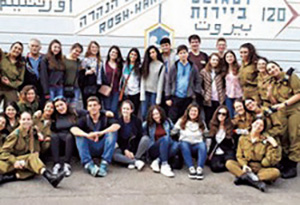

There is a halachic hierarchy principle of prioritization when it comes to aiding those in need called aniyei irkha kodem. This means that we are obligated to provide for the needy in our own community first, before extending aid to others. I believe that this norm is a value that applies beyond simple charity; in fact, it is applicable to many areas of Jewish life. One in particular is Jewish education.
Those in the traditional Conservative and Orthodox world understand the importance and imperative of a strong education and send their children to yeshivot and day schools. The education of children is enhanced by a fully traditional Jewish home life and often by the 24/7 environment of Jewish camps during the summer months.
We are blessed in Northern New Jersey with a multiplicity of Jewish day schools and yeshivot. In fact we have the second-highest national percentage of eligible children in Jewish schools, and the highest percentage of parents who are themselves day school graduates. And yet, there are thousands of children receiving no Jewish education at all and many who only attend after school congregational schools. This is not the forum to debate the pros and cons of congregational schools. They are engaged in the impossible task of imparting Jewish knowledge, identity and values in a very limited time span over a few years until bar/bat mitzvah. To put it in context, five years in an afterschool synagogue program equals less than one year in a day school vis-à-vis hours spent learning about Judaism. The principals and teachers are frustrated because instructional time is so truncated. Is it more important to be able to read Hebrew or to develop Jewish ideals and identity?
Despite the odds, some schools do connect with their students. However, the vast majority drop out after bar/bat mitzvah at a time when they can first begin to really understand what it’s all about. The preeminent Jewish sociologist Prof. Steven M. Cohen observed that “The most critical age for developing an identity and attachment to one’s religion, culture and roots is during adolescent time, the period of age 13 to 17.” Enter the Bergen County High School for Jewish Studies (BCHSJS). They mix relevant Jewish studies with social and community service activities that foster lifelong friendships and commitment to Judaism. For more than 40 years, through this combination of learning and doing, they’ve helped teens to explore their Jewish identity while furthering Jewish continuity.
Meeting at the Moriah School on Sunday mornings, BCHSJS’ mission is to provide a stimulating and supportive environment for high school students to discover and develop their Jewish identity. Jewish continuity is the ultimate goal of BCHSJS. They combine meaningful education with social activities over five years (grades 8-12) that help students connect with other Jewish teens on the same journey. The school’s program is based on the core Jewish values of Klal Yisrael, Tikkun Olam, Derech Eretz and Ahavat Israel.
Teens come to BCHSJS from 22 different communities. Their experience and exploration of Jewish culture, heritage, values, morals and the centrality of Israel help them foster a deep Jewish identity that lasts a lifetime. By making Judaism relevant at this formative time in a young person’s life, the school creates the bridge for them to become confident, committed Jewish adults.
The most moving part of a BCHSJS graduation is listening to seniors, many in tears, bidding farewell to teachers with whom they developed a strong bond and bragging about wanting to get up early on a Sunday morning to attend stimulating classes. Here are some direct quotes:
“BCHSJS has changed all aspects of my life, my knowledge of Judaism, my friendships and my overall confidence as a person.”
“BCHSJS truly made a mark on my life. It showed me that continuing my Jewish education did not have to be boring. I made friends, participated in many interesting classes and, importantly, rekindled a Jewish identity I’d felt that I’d lost.
“Every Sunday when I wake up and go to BCHSJS I think to myself that this is a place where I can be myself and I don’t have to be afraid to show who I really am.”
“BCHSJS helps keeps Jewish teens Jewish!”
These teens who may not come from frum homes join Hillel and kosher food plans, visit Israel, often make aliyah, serve in the IDF, take Judaica courses on campus and wind up marrying Jews. Some even transfer to day schools and attend YU and Stern. The BCHSJS Annual Dinner will take place on Thursday April 26, at 7 p.m. at Temple Israel at 475 Grove Street in Ridgewood. Contact the school at 201-488-0834 to make a reservation or to donate.
Coming full circle, to the rabbinic priority obligation of helping those in your community, we can also view this as the specific Biblical commandment of hashavat aveidah, returning that which has been lost. Many families and their children are distanced from their Jewish tradition. This is an opportunity to help restore that pintele yid. Supporting BCHSJS will yield untold dividends in the future.
By Wallace Greene
Dr. Wallace Greene has been a board member of BCHSJS for 20 years.











